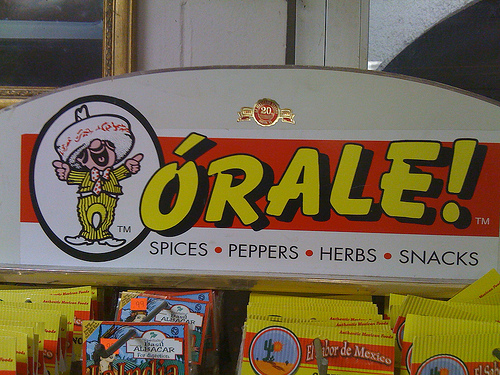Yes! This is a great question because órale in Spanish is one of those versatile Mexican slang words that can mean a few different things.
Generally órale in Mexican Spanish means got it, okay, no problem or something similar.
What does ¡Órale! mean?
You will see and hear this word everywhere from comedian Gabriel Iglesias talking about the “Fat & The Furious” (orale=hey) to popular country music lyrics (orale=hell yeah).
How Do You Pronounce Órale?
The ¡Órale! Spanish pronunciation has the primary stress on the first syllable (i.e., O-ra-le).
Basically, it’s a Spanish slang word used among Mexicans meaning something along the lines of ‘hey’, ‘right on’, ‘hell yes’, ‘okay’ and ‘alright’; usually said enthusiastically.
The word came from ‘ahora’ which means ‘now’ so you can see how orale has many different uses.
Here are a few different meanings of orale in English:
- hey
- hell(s) yeah
- alright
- okay
- watch it
- that’s amazing!
- wow!
Orale is an interjection accepted by the Royal Academy of Spanish Language Dictionary (DRAE) as a colloquialism from México and it is used “to exhort.” Colloquialism is just a fancy word for casual slang.
That definition seems vague and only is useful to know that the term is included in the Spanish language’s most important dictionary. I have checked what my reference sources explain about this expression and here they are:
1. Jorge Mejía Prieto in his book Así habla el mexicano defines the interjection ¡órale! as an “expression used to encourage someone to do a certain thing.”
2. The previous definition is the same given by DRAE, but Roxana Fitch in her book Jergas de habla hispana adds two other meanings: interjection to express agreement and to indicate discomfort or surprise.
3. Diccionario breve de mexicanismos by Guido Gómez de Silva includes this expression under the term ora that is a contraction of ahora (now). So, ¡órale! is formed by combining ahora + -le. His definition can be summarized as “to exhort.”
4. The Diccionario de americanismos published by the Asociación de Academias de la Lengua Española gave us the same three meanings, but it includes an additional fact: the expression ¡órale! is also used in Guatemala, Honduras, and El Salvador that, in my opinion, has to be related to their proximity to Mexico.
Example uses of ¡Órale! in English
With those three meanings of ¡órale! here are some real-life examples used by Mexicans on Twitter:
1. to exhort, to encourage. In this circumstance similar expressions are “Hurry up” and “Lets go.”
Orale huevones! Ya apurense que esos vagones del metro no se van a llenar solos!!!!
— Gabs! Así! a secas.. (@G_a_b_s) September 13, 2012
2. to express agreement. A good equivalent expression is “OK,” “I got it” or “De acuerdo” in Spanish.
nos juntamos a estudiar en mi casa.??? va orale yo llevo las cervezas..
— Fer Calderòn (@Cp_fer)
3. to indicate discomfort or surprise. A surprise expression in Spanish can be similar to “¡Genial!” or “¡Tremendo!”
¡Orale! Está bien chingón tu Nokia ¿En qué Oxxo la compraste?
— Forever Mamón ™ (@yuppiewill) September 16, 2012
How Do You Respond To ¡Órale!?
First, check your surroundings. Are they indicating it’s your turn or to hurry up? Or are they just trying to get your attention or are they agreeing with you?
Órale, Órale. Que Te Pasa? = (right now) Hey hey, what’s up with you? Response: Tell them how you are feeling or just say nada (nothing).
Órale, va. = I agree with you. Response: Bien (good)
Orale, por favor, sal conmigo? = Come on, please go out with me? Response: Si or No. I guess that one depends on how you feel about someone begging for a date. 🙂
Now you know when and how to use this spontaneous expression commonly used in Mexico and the US.
I’m going to confess here that my Mexican Spanish is weak. It’s the first place I lived abroad while learning Spanish, so I really don’t remember that much. At the time I was worrying about if I hablé, hablaba, “hablía,” habló, “hablieron,” hable, “habliera” or hablaré. I hadn’t yet been able to understand the subtleties of Mexican Spanish. So, if you have some insight into the many uses of ÓRALE, please share them in the comments below. And thank you for taking the time to share.
I always encourage Speaking Latino readers and followers to ask me Spanish slang questions through Twitter and Facebook. I am more than happy to try to help you unravel your Spanish doubts. In fact, I have lots of fun investigating the different questions that come up. And it’s also a great way for me to continue learning and to dust off some old skills.
In fact, that’s how the idea from this article came about:
One of my Twitter followers asked me a while back the following question: @JaredRomey Can you explain to me the meaning and various usages of “Órale”? You might notice in the tweet that this was asked a while ago; I didn’t just respond to him. I’m not that slow, I promise. It just took me a bit extra to put this post together. He had his answer a couple days after he wrote.
@JaredRomey Me puedes explicar el significado y los varios usos de “Orale”?
— Samuel Adamek (@samueladamek)
Expand your Mexican Spanish!
Check out my ebook Quick Guide to Mexican Spanish which features more than 450 terms and sayings will help you become familiar with the richness of the country’s Spanish. It includes slang and colloquial expressions that you will likely run across in everyday conversations.
Check out these other Mexican Spanish Slang Word articles.
Featured photo credit: jm3 via photo pin cc
